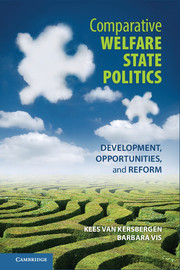Book contents
- Frontmatter
- Contents
- List of Tables and Figures
- Preface and Acknowledgments
- 1 Introduction
- 2 The Welfare State
- 3 The Logics of the Welfare State
- 4 Welfare State Regimes
- 5 What Do Welfare States Actually Do?
- 6 Toward an Open Functional Approach to Welfare State Reform
- 7 Why Do We Need to Reform the Welfare State?
- 8 Why Do We Need to Reform the Welfare State?
- 9 Why and How Do Politicians and Governments Pursue Risky Reforms?
- 10 Can and Will the Welfare State Survive the Great Recession?
- References
- Index
7 - Why Do We Need to Reform the Welfare State?
Part I: Globalization as a Functional Pressure Coming from the Outside
Published online by Cambridge University Press: 05 June 2014
- Frontmatter
- Contents
- List of Tables and Figures
- Preface and Acknowledgments
- 1 Introduction
- 2 The Welfare State
- 3 The Logics of the Welfare State
- 4 Welfare State Regimes
- 5 What Do Welfare States Actually Do?
- 6 Toward an Open Functional Approach to Welfare State Reform
- 7 Why Do We Need to Reform the Welfare State?
- 8 Why Do We Need to Reform the Welfare State?
- 9 Why and How Do Politicians and Governments Pursue Risky Reforms?
- 10 Can and Will the Welfare State Survive the Great Recession?
- References
- Index
Summary
Introduction
In the previous chapter, we outlined our open functional approach to welfare state reform. In this approach, “objective” functional pressures play a key role. What are those pressures and how hard are they pushing? This chapter examines a key pressure coming from the outside, globalization; Chapter 8 focuses on the pressures from within.
What functional pressure for welfare state reform arises from globalization? Globalization, the increased interconnectedness of economies, is generally seen as a by-product or even an inherent feature of capitalism. It was two centuries ago that the first globalization or “free trade thinkers,” Adam Smith (in 1776 [2003]) and David Ricardo (in 1817), wrote their seminal work, and the debate on (the effects of) globalization is still going on. With the onslaught of the financial crisis in 2008 and the sovereign debt crises since 2009, the voices against unlimited capitalism have become much louder, although protests against globalization and international financial capital (e.g., the occupy movement that started in 2011) have been occurring since the late 1990s. For example, in 1999 violent protests took place in Seattle, the place that has been labeled the “birthplace of the ‘backlash against globalisation’” (The Economist 2000: 97). According to the anti-globalists – a label that has gone somewhat out of vogue lately – globalization is a bad thing because it only makes the rich (relatively) richer and the poor (relatively) poorer. This view contrasts squarely with that of Smith and Ricardo, who saw increased trade openness as – what we now would call – a win-win situation. They argued that globalization’s possibly negative effects in the short run could easily be compensated by its positive effects in the longer run. International trade increases the available resources for all; it enlarges the economic pie. In the words of Ricardo (2004 [1817]: 77):
No extension of foreign trade will immediately increase the amount of value in a country, although it will very powerfully contribute to increase the mass of commodities, and therefore the sum of our enjoyments.
- Type
- Chapter
- Information
- Comparative Welfare State PoliticsDevelopment, Opportunities, and Reform, pp. 123 - 136Publisher: Cambridge University PressPrint publication year: 2013



